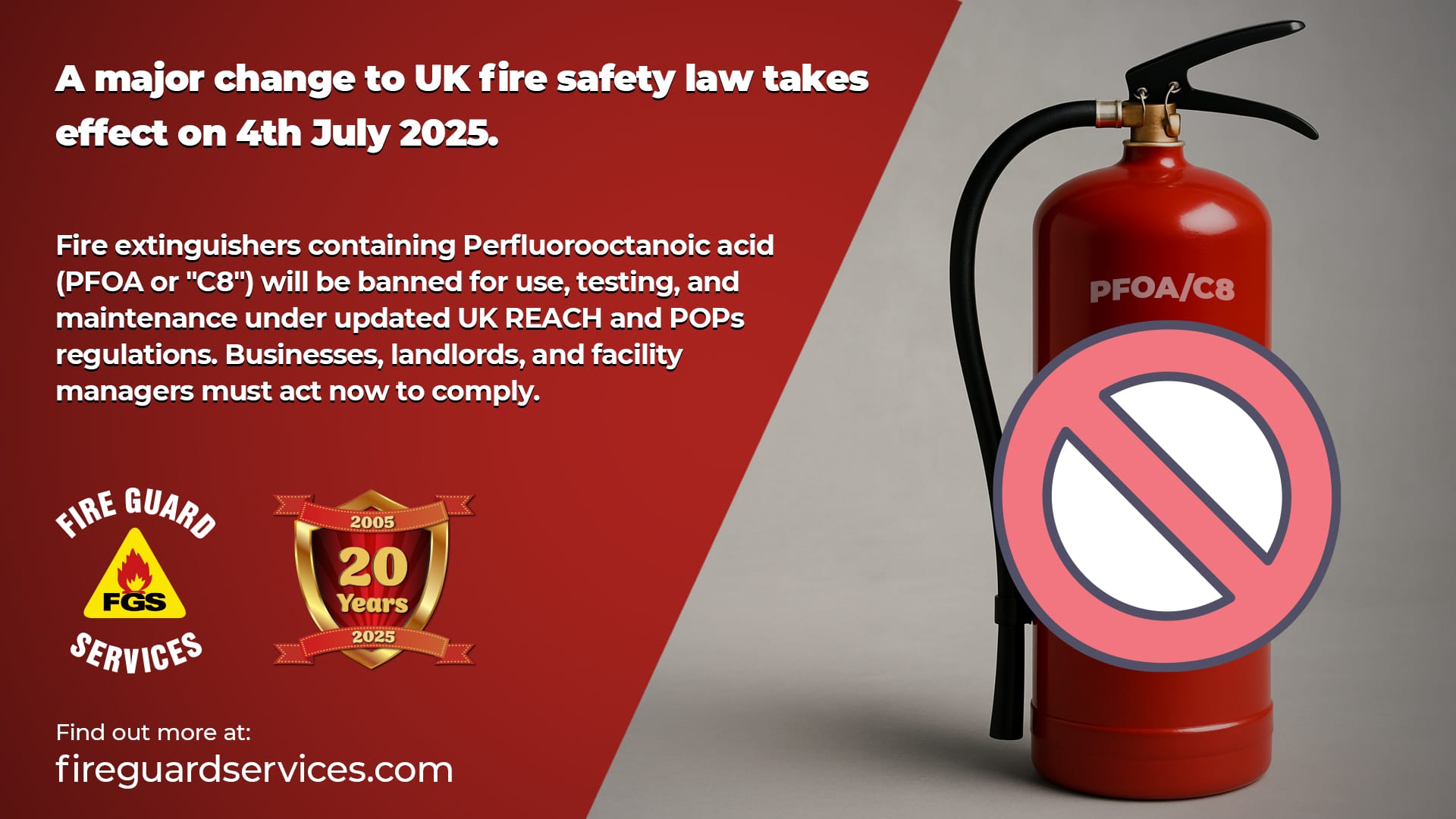UK Fire Extinguisher Ban – July 2025
UK Fire Extinguisher Ban: Is Your Business Ready for the 4th July 2025 Deadline?

A significant change is coming to fire safety regulations in the UK, and it’s crucial for every business, landlord, and facility manager to be prepared. From 4th July 2025, the use, testing, and maintenance of fire extinguishers containing Perfluorooctanoic acid (PFOA), often referred to as "C8" chemistry, will be strictly prohibited across the United Kingdom. This isn't just a recommendation; it's a legal requirement under updated UK REACH and Persistent Organic Pollutants (POPs) legislation. Read on to find out more about the UK Fire Extinguisher ban.
At Fireguard Services, we want to ensure all our existing, new, and future clients are fully informed and compliant.
Understanding the Ban: It's About PFOA (C8), Not All AFFF Fire Extinguishers
There's a common misconception that this ban affects all Aqueous Film-Forming Foam (AFFF) fire extinguishers. Let's be clear: the ban specifically targets AFFF extinguishers that contain PFOA (C8).
PFOA is part of a group of chemicals known as Per- and Polyfluoroalkyl Substances (PFAS), often dubbed "forever chemicals" because they resist breaking down in the environment. Their persistence leads to accumulation in soil, water, and living organisms, posing significant environmental and health risks, including potential links to cancer and developmental issues. While PFOA is the immediate focus, other PFAS chemicals like PFOS and PFHxS are already prohibited in firefighting foams.
It's important to note that many major manufacturers voluntarily phased out C8 AFFF over a decade ago. This means newer units are likely compliant. However, older extinguishers, particularly those manufactured or refilled before 2016, are at a higher risk of containing PFOA and require immediate attention.
If you have purchased your AFFF Fire Extinguishers from Fire Guard Services since 2020, then you are compliant as we ceased providing these types of fire extinguishers since then, but if in doubt, please feel free to contact us.
Identifying Your Extinguishers: What to Look For
To determine if your existing AFFF extinguishers are affected, follow these steps:
Check Labels and Documentation: Look for explicit mentions of "C8 AFFF foam," "PFOA," "PFOS," or "perfluorinated compounds" on the extinguisher label or its Safety Data Sheet (SDS). Older models might use terms like "long-chain fluorotelomer," which also indicates C8-based ingredients.
Note Manufacture/Refill Dates: Extinguishers produced or refilled before 2016 are most likely to contain PFOA.
Seek Professional Assessment: If documentation is missing, unclear, or if you have any doubt, it is crucial to contact a professional fire safety service. Reputable providers can offer written confirmation of PFOA-free status or arrange for laboratory analysis of the foam content.
Assume non-compliance if you cannot definitively prove PFOA-free status.
The Fire Industry Association FIA also provide some useful information into this change as do the BAFE.
Crucial Point: Refilling is NOT an Option. You cannot simply refill an extinguisher that previously contained PFOA with a compliant foam. Trace amounts of the banned chemicals will inevitably remain within the extinguisher, rendering it non-compliant. Any PFOA-containing unit must be completely replaced.
Your Action Plan: Ensuring Compliance by 4th July 2025 Or As Soon As You Possibly Can
Immediate Inventory and Identification: Conduct a thorough review of all foam extinguishers on your premises to identify any PFOA-containing units.
Take Non-Compliant Units Out of Service: Once identified, these units must be removed from service immediately. Continuing to use, service, test, or refill them after 4th July 2025 will lead to regulatory enforcement and penalties.
Arrange for Safe Disposal: PFOA-containing extinguishers are classified as hazardous waste and require specialized disposal. This must be handled by a licensed hazardous waste contractor, typically involving high-temperature incineration. Retain all consignment notes as proof of compliant disposal.
Replace with Compliant Alternatives: Plan to replace non-compliant units with certified, PFOA-free models.
Choosing Compliant Fire Extinguisher Alternatives
The market offers effective and environmentally responsible alternatives. Your choice should always be based on a comprehensive fire risk assessment tailored to your specific hazards.
Fluorine-Free Foam (FFF) Extinguishers: These are excellent eco-friendly replacements for traditional AFFF units, effective on Class A (solid combustibles) and Class B (flammable liquids) fires. They are versatile and suitable for offices, schools, and warehouses.
Water Mist Extinguishers: Containing only de-ionised water, these are non-toxic and highly versatile. They are effective on Class A, B, C, and F fires, and are safe for use on live electrical equipment. Ideal for sensitive environments like schools, nurseries, and heritage buildings.
Other Alternatives:
Dry Powder (ABC) Extinguishers: Multi-purpose for Class A, B, and C fires, and electrical fires under 1000V. Best for outdoor environments or vehicles, but can be messy and obscure vision in enclosed spaces.
CO2 (Carbon Dioxide) Extinguishers: Primarily for electrical and Class B fires, leaving no residue. Ideal for server rooms and offices, but not for Class A or F fires, and pose an asphyxiation risk in confined spaces.
Looking Ahead: Beyond PFOA
While the immediate focus is on PFOA, the Fire Industry Association (FIA) and other regulatory bodies indicate a broader trend towards phasing out all PFAS, including C6 fluorotelomer-based foams. A full ban on all PFAS-containing extinguishers is not expected before 2026, with potential phase-out periods extending towards 2030.
The FIA recommends proactively transitioning to fluorine-free alternatives now, as current extinguishers reach the end of their service life. This "future-proofing" approach helps avoid future compliance challenges and aligns with environmental best practices.
Partner with Fireguard Services for Seamless Compliance
Don't wait until the last minute. Fireguard Services is here to help you navigate these changes. We can assist with:
Comprehensive Audits: Identifying any non-compliant extinguishers on your premises.
Expert Advice: Guiding you on the most suitable compliant alternatives for your specific needs.
Safe Disposal: Arranging for the compliant and environmentally responsible disposal of hazardous units.
Supply and Installation: Providing and installing new, certified PFOA-free fire extinguishers.
By taking proactive steps now, you can ensure your business remains compliant, safe, and environmentally responsible. Contact Fireguard Services today to discuss your fire safety needs in , and prepare for the upcoming ban.
